Holiday season is here, and although celebrations may look a little different this year, including pets in the festivities is always a comforting tradition. However, tempting turkey smells and hot pumpkin pies fresh from the oven are difficult for humans and pets to resist, and while pre-meal tasting may do no more than ruin your appetite, it can lead to an unexpected trip to the emergency vet for your pet. Keep celebrations hazard-free by following these 10 tips from our Palm City Animal Medical Clinic veterinary team.
#1: Designate the kitchen off-limits to four-legged family members
Kitchen chaos is hard to avoid in the days and hours leading up to the Thanksgiving meal, especially if counter surfing is your furry friend’s preferred sport. However, hot burners and knives can lead to physical injury. Additionally, discarded wrappers and raw meat remnants can cause salmonella if eaten by your pet, leading to gastrointestinal (GI) distress, infection, or pancreatitis.
#2: Avoid sharing your plate with your pet
Common Thanksgiving ingredients are the culprit for many pet emergencies. Rich, fatty foods are difficult for pets to digest and can lead to GI distress and inflammation, including pancreatitis. Pancreatitis is a potentially deadly inflammatory condition that can cause vomiting, diarrhea, lethargy, and dehydration. Although less common, cats with pancreatitis may experience lethargy, dehydration, anorexia, and low body temperature. Never feed your pet the following dishes:
- Stuffing
-
- Onions, garlic and chives — Cats are especially susceptible, and small amounts can cause a life-threatening anemia and red blood cell breakdown. Dogs are also at risk if they consume large amounts. Clinical signs include panting, high heart rate, and blood in the urine.
- Raisins and grapes — For some dogs, only one raisin or grape can be toxic to their kidneys. Clinical signs can occur up to two hours after ingestion and include vomiting, diarrhea, lethargy, tremors, and excess urination.
- Sage, spices, and herbs — Stuffing and other premade holiday foods often contain sage, various herbs, essential oils, and resins. These flavorings can be toxic, especially to cats, and result in GI upset or central nervous system depression.
- Side dishes
- Yeast rolls — Eating unbaked yeast rolls or any other raw dough can result in painful gas or, in severe cases, intestinal bloating.
- Corn cobs — Most pets easily digest cooked corn, but corn cobs are difficult to chew, and can result in dogs swallowing them whole, leading to GI blockage or tears.
- Casseroles — Most casserole dishes contain heavy cream or other milk-based products. Animals lack enough lactase, which is the enzyme needed to properly digest dairy products. Eating any milk-based product can cause GI upset and diarrhea.
#3: Say “Yes” to post-meal naps with your pet and “No” to sharing desserts
Once the tryptophan has kicked in, nothing is better than a cozy nap with your furry friend. However, avoid sharing your post-nap desserts, especially the following:
- Chocolate — All chocolates, especially dark and baker’s chocolate, contain the stimulants caffeine and theobromine, which can be deadly to dogs. Clinical signs include vomiting, diarrhea, hyperactivity, elevated heart rate, and possible death.
- Sugar-free treats — Xylitol is present in many sugar-free foods, and in some peanut butters. Small amounts can be toxic and cause liver failure, seizures, and death in some cases.
- Alcohol — Foods or beverages containing alcohol can cause a variety of problems, including vomiting, diarrhea, difficulty breathing, tremors, or death.
#4: Use a pet-proof lid to prevent a garbage can buffet
Noses may be tempted to investigate discarded food, especially scraps and bones. Turkey bones can lead to intestinal obstructions or tears, so empty the garbage frequently to prevent a Thanksgiving pet emergency.
#5: Don’t let decor become dangerous to your pet
Ensure that all lit candles are out of reach of paws and tails to prevent burnt fur or house fires. Avoid using scented candles or potpourri that contain essential oils, especially the oils listed here. Their toxic effects include coughing, difficulty breathing, seizures, and possible death.
#6: Ensure your pet gets their regular exercise or playtime
Keeping a consistent routine is paramount for your pet, especially in the midst of holiday chaos. Never skip their daily playtime or exercise to avoid behavioral outbursts resulting from pent-up energy.
#7: Check your pet’s microchip and collar prior to the celebration
In case your pet takes an unexpected trip outside in search of tasty treats, always ensure they are wearing an identifiable collar or tag, and that their microchip contact information is up-to-date.
#8: Designate a pets-only party room
Ensure pets have a safe room or crate where they can relax away from the chaos. Play soft music, and provide a special toy or treat to keep them comfortable, calm, and away from potential holiday hazards.
#9: Keep extra pet toys and treats on hand
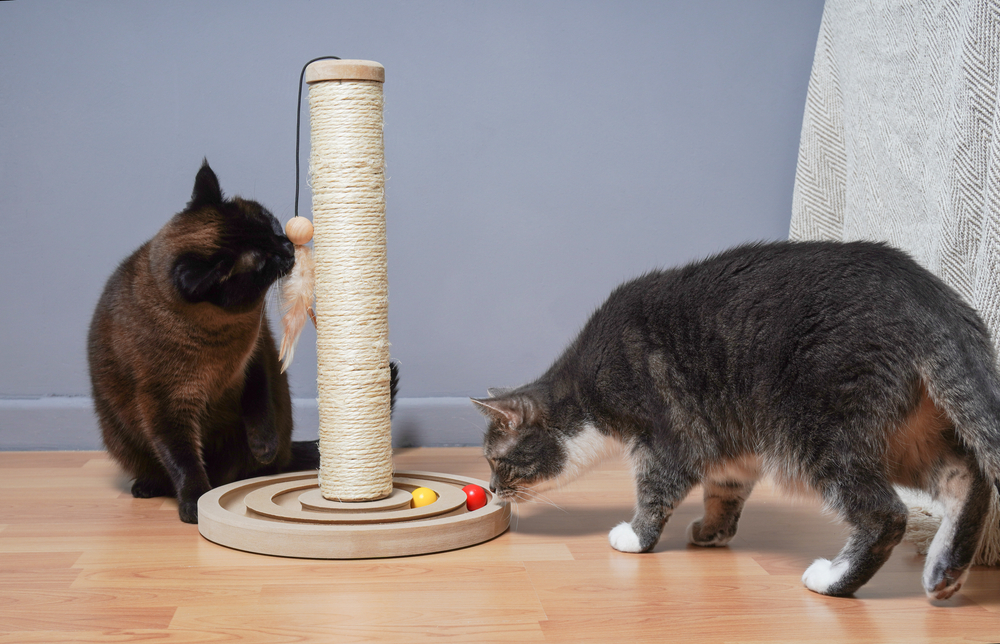
Special toys and treats are a great way to keep your pet distracted and occupied during the festivities. Use them as positive reinforcement for your pet behaving well and staying clear of the kitchen.
#10: Keep pet emergency numbers handy
Pet mishaps and accidents can happen at any time. Always keep the ASPCA Poison control number and a local animal emergency hospital number in a visible and easily accessible location.
Our Palm City Animal Medical Clinic team wishes you and your pet a wonderful Thanksgiving. If you have questions about keeping your pet safe, or if they get into any trouble, call or text our office. We will always be grateful to be able to help your pet.

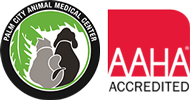
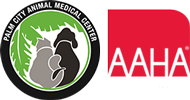

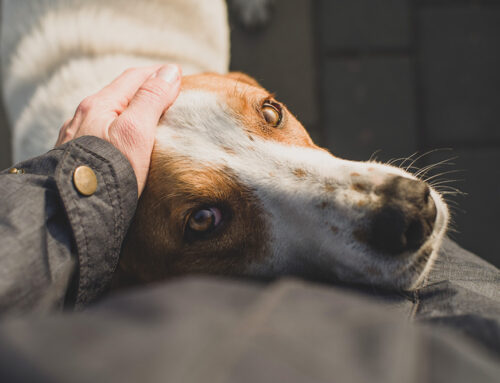
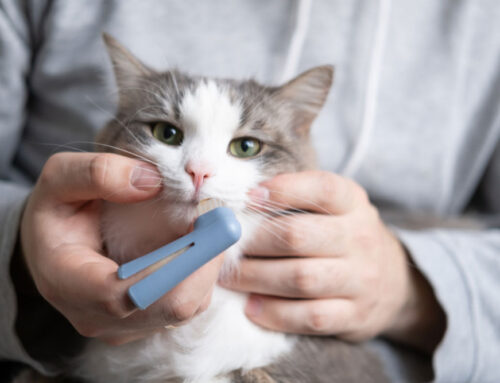


Leave A Comment